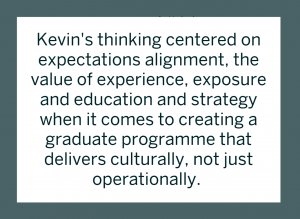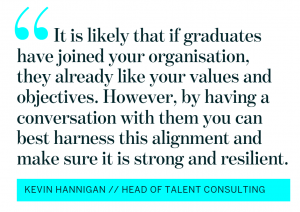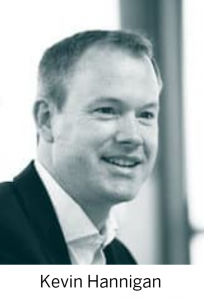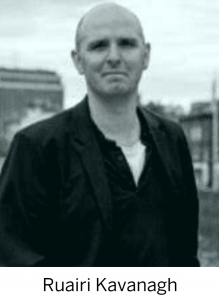During our recent sponsorship of gradireland’s Breakfast Masterclass, HPC’s Head of Talent Consulting, Kevin Hannigan addressed the topic of ‘Aligning your graduate programme with your organisational culture’. Editor of gradIreland, Ruairi Kavanagh’s article below provides a synopsis of the event’s presentation and panel discussion.

The latest gradireland Breakfast Masterclass took place on Thursday 10th February. It was a virtual event, hopefully the next one will be a return to live, and it explored the broad theme of organisational culture and graduate recruitment.
Aligning your Graduate Programme with your Organisational Culture, in partnership with HPC, saw a keynote presentation and panel discussion on the importance of culture and what key questions and issues companies need to address when either refining an existing graduate programme or establishing one from scratch.
You’ve successfully attracted top-quality graduates into your organisation through your on-campus activities, work at graduate fairs, social media campaigns and a brilliant selection process. Your graduates will start work with you full of energy and expectation for what their graduate programme will bring them, eager to build a career with you. But now the hard work starts. How will you build a development programme for your graduates that builds their capability and reflects your organisational culture? How will you make sure that at the end of the programme that your graduates remain eager to build a career with you and that you don’t suffer widespread attrition?
Keynote Presentation
The keynote presentation was made by Kevin Hannigan, Head of Talent Consulting at HPC. HPC has been providing people development solutions for over 40 years, partnering with clients to create a high-performance culture that has a positive impact on business growth and personal development. They are focused on empowering people to empower performance.
Kevin began by explaining his thinking on expectations alignment, the value of experience, exposure and education and strategy when it comes to creating a graduate programme that delivers culturally, not just operationally.
Pillars of Culture
He broke culture down into four pillars; values, the way we engage with each other, what we believe to be true and the stories we tell. In order for graduates to make the best start in an organisation, the presentation outlined the broad structure which HPC’s research shows makes for the most effective environment for graduates. This is most commonly based around teamwork, working in operational, multi-disciplinary teams doing valuable and challenging work on real projects. Companies need to think about what will work for their organisational objectives, and graduate strategy. For some organisations, Kevin explained, there will be large scale projects that graduates should be a part of, but there can also be smaller projects which graduates themselves can take charge of. But he cautioned, they must be projects with real value, graduates can spot a fake project easily and if they are exposed to that it will likely cause them to disengage from the organisation and from the objectives that you are trying to achieve.

Kevin then touched on the interesting, and often overlooked, topic of feedback and how it can be best delivered to graduate employees. He says there is a misconception that today’s graduates can be poor recipients of feedback, and a further misconception that they are particularly needy when it comes to requiring feedback. Kevin explained that there is no indication, based on research, that today’s graduates have a higher need for feedback than previous generations. He added that when it comes to feedback, there was so much effort put into evaluating performance that there is not often enough consideration into how to deliver that feedback, and that is something that organisations should invest resources into. Managers needs to be skilled in delivering feedback and be able to relate it to your values.
It’s also very important that employers translate their values into what graduates actually experience in the course of their work, what they should do and what they should not do. We also need to discuss the graduates personal set of values. Likely, explained Kevin, if they have joined your organisation, they already like your values and objectives. However, by having a conversation with them you can best harness this alignment and make sure it is strong and resilient. On foot of that, the stories that reflect your organisation’s culture will also be heard outside of your company, as organically, your values will be something which graduates are proud of and eager to share, Kevin explained.
Don’t obsess about the competition
Graduates also need to be coached in the methods of working effectively as part of a team, something which Kevin believes is critical to success. He added that it is important that organisations consider only elements that will work for them, and to avoid over analysing the competition and feeling the need to add other culture elements that may not be right for your organisation. It’s about doing the things that are right for your business, identifying the elements that will achieve for your organisation. Key skills and key capabilities that are developed on graduate programmes should reflect the objectives of your organisation.
The presentation also touched on the concept of ‘power skills’, which are also referred to, perhaps inaccurately, as soft skills. As Kevin says, in a world where technology will lead, the skills that will make your business stand out and power it forward will be uniquely human. Collaboration, trust and agility are vital in developing a growth mindset.
These are just some of the insights contained in Kevin’s presentation, which you can download in full while watching the replay which includes the panel discussion at the following link.
Panel Discussion
Following Kevin’s presentation, we moved to a panel discussion to discuss the themes raised, and the experiences of various organisations. We were delighted to welcome the following panelists to the discussion:
Siobhain Scanlon, Early Careers Manager at Musgrave
Cathy Watts, Graduate Attraction & Development Manager at Kingspan Group
Kevin Henry, Learning & Talent Manager at Permanent TSB
The following 40 minutes saw the panel address a wide range of questions submitted by attendees to the Masterclass. These included questions on management and leadership potential amongst graduates, how a graduate is expected to fit into a culture in some organisations as opposed to being a distinct addition to the cultural mix and what to look out for in terms of friction between existing structures in your organisation and your graduate programme. The panel also discussed some key questions that companies should ask themselves about why they are establishing a graduate programme in the first place, and what the objectives are. Thanks to all our panelists, attendees and particularly HPC for making the event so enjoyable and insightful for all concerned.
Kevin Hannigan – HPC

Kevin Hannigan leads the Learning and Talent Consulting offering and is also a Client Director at HPC. He works with clients to develop, deliver and evaluate bespoke solutions that drive performance across their business.
He is a highly skilled consultant and facilitator with a wealth of experience in designing the systems and processes that support effective learning, measurement and talent development.
Before joining HPC in 2013, Kevin was head of learning and development for Matheson, Ireland’s largest law firm and for C&C Ireland.
Connect with Kevin on LinkedIn >>>
Connect with HPC on LinkedIn >>>
Ruairi Kavanagh – gradireland

Ruairi is the Managing Editor at gradireland and was the moderator of the Breakfast Masterclass. He is a writer, editor and journalist with over 25 years of experience across print, press, online and advisory.
ruairi.kavanagh@gradireland.com
Connect with Ruairi on LinkedIn >>>
Connect with gradireland on LinkedIn >>>
